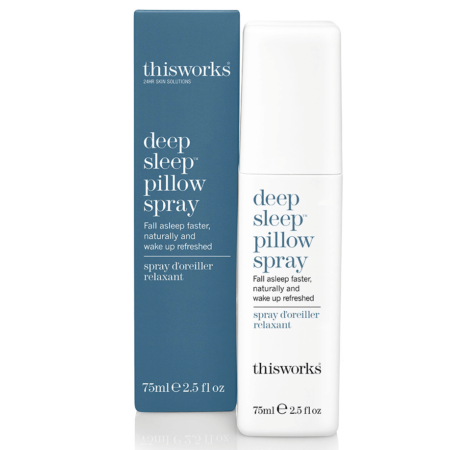12 Things You Should Do (And Avoid) For A Better Night's Sleep
 via Giphy
via Giphy
Sleep is one of those things we all need, but not everyone is great at getting it, especially RN. Whether you have trouble falling asleep, staying asleep, waking up in the morning, or all of the above – getting through the next day in a productive manner can be a real B if you failed at sound sleep the night before. Not only will bags occur – and your skin appear dull, congested, or puffy – but your whole vibe suffers and that’s never good news for anyone.
“Many people assume that insomnia refers only to chronic sleeplessness and they’re wrong,” explains Elizabeth Somer, M.A., R.D., and Medical Advisory Board member for Persona Nutrition. “Insomnia is any sleep problem and if you’re suffering from one, you’re not alone – 95% of adults experience some form of insomnia during their lives.”
Well great. If it makes you feel better, Winston Churchill, Charles Dickens, Cary Grant, and Marilyn Monroe were famous insomniacs as well, but luckily there’s a multitude of things you can do for better sleep.
1. Avoid Eating A Large Meal Before Bed
 via Giphy
via Giphy
According to Somer, big dinners make you temporarily drowsy, but they also prolong digestive action, which keeps you awake. Instead, try eating your biggest meals before mid-afternoon and eat a light evening meal of 500 calories or less, with some chicken, extra-lean meat or fish to help curb middle-of-the-night snack attacks.
2. Avoid Spicy Foods After Lunch
 via Giphy
via Giphy
In the same manner, Somer says spicy or gas-forming foods also might be contributing to your sleep problems. Dishes seasoned with garlic, chilies, cayenne, or other hot spices can cause nagging heartburn or indigestion, while the flavor-enhancer MSG (monosodium glutamate) causes vivid dreaming and restless sleep in some people, so limit your intake of gas-forming foods to the morning hours and thoroughly chew food to avoid gulping air.
3. Workout During The Day
 via Giphy
via Giphy
Exercise more. “A major difference between good sleepers and poor sleepers is not what they do at bedtime, but what they did all day,” says Somer. “Good sleepers exercise and use every opportunity to move. Physical activity helps a person cope with daily stress and tires the body so it is ready to sleep at night.”
4. Try Supplements
 via Giphy
via Giphy
“Vitamins and supplements can be an option for supporting sleep and helping you to stay asleep, so if you’re looking for a personalized vitamin program, I suggest taking Persona Nutrition’s free 3-minute online assessment,” says Somer. “They offer more than 86 high-quality vitamins and supplements, including its Sound Slumber program, which features a combination of three supplements that are used in rotation to optimize sleep patterns.”
5. Watch Out for Caffeine
 via Giphy
via Giphy
As Somer points out, caffeine can linger in the system for up to 15 hours, revving up your nervous system and interfering with sleep. “If you are a coffee drinker troubled by sleep problems, try eliminating caffeine.” If the idea of no caffeine is too terrifying, then stick to mornings and avoid coffee after lunch. One tip is to have your one and only coffee at 11 am. Although you often feel like you need coffee when you get up, this is actually when your body is the most awake, according to scientist Matthew Walker and writer of Why We Sleep: The New Science of Sleep and Dreams.
6. Be Consistent
 via Giphy
via Giphy
According to NYC Sleep Doctor, Dr. Janet Kennedy, keeping a consistent nightly pre-bedtime routine is key, as this signals to your body that it’s time to get sleepy. “Turn off phones, laptops and handheld screens at least one hour before bed, to allow the brain to transition away from the day’s activity,” she says.
7. Get an Amber Reading Lamp
 via Giphy
via Giphy
If you must read by bedlight, Kennedy suggests using an amber reading lamp to minimize blue light exposure and choosing fiction over most other topics. “This gives the mind a compelling distraction from stress and racing thoughts, while the body takes over with physical fatigue,” she adds.
8. Switch Up Your Sleep Essentials
 via Giphy
via Giphy
Kennedy also advises sleeping with foot warmers, or a Weighted Sleep Mask and/or Weighted Blanket, to maximize the natural release of melatonin. Wearing sleepwear designed to keep heat and moisture away from the body, such as the Soma Intimates Cool Nights line, is also a good idea. “The mattress also makes a big difference,” she says. “If it holds heat, it can be especially hard to return to sleep when you wake up during the night. It’s difficult to fall asleep when you’re hot and it feels uncomfortable to lie down on a hot mattress, so I sleep on the Leesa Legend, which is designed to maximize airflow and disperse heat away from the body.”
9. Avoid Alcohol
 via Giphy
via Giphy
While you might think a glass of red wine would do wonders for the whole passing out thing, alcohol right before bedtime actually does the opposite. “It causes night waking, leaving you much less rested,” says Kennedy.
10. Don’t Sleep With the TV On
 via Giphy
via Giphy
“The brain listens and processes content even while we sleep, which can interfere with sleep cycles and compromise sleep quality,” explains Kennedy.
11. Don’t Snooze the Alarm
 via Giphy
via Giphy
Diehard snoozers, we feel you, but Kennedy warns that you should only set the alarm for the time when you really must get up. “Getting 10-minute increments of extra sleep can leave you feeling groggy and it can make it harder to fall asleep when you want to the next night.”
12. Don’t Stress About Night Wakings
 via Giphy
via Giphy
Be careful about what you do if you wake up in the middle of the night. If you have trouble returning to sleep (i.e. it takes more than 15-20 minutes), Kennedy advises getting up and doing something to distract yourself – like reading, coloring, or sudoku – until you start to feel sleepy again: “Taking the pressure off of returning to sleep can speed up the process,” she says.
Products We Love for a Better Night’s Sleep:
 Source: HUM Nutrition
Source: HUM Nutrition
HUM Nutrition BEAUTY zzZz, $10: This melatonin and B6 packed tablets reduce the amount of time it takes to fall asleep and ensure you sleep more peacefully – and function more productively the next day. They’re also great for your skin!
 Source: Dr. Kerklaan
Source: Dr. Kerklaan
Dr. Kerklaan Therapeutics CBD Sleep Cream, $40: This CBD line is the first to be doctor-founded and formulated and Dr. Kerklaan’s popular CBD Sleep Cream will make you feel relaxed and well-rested, thanks to hemp extract with melatonin. It also smells like mandarin and lavender, which is pretty heavenly to sniff while you snooze.
 Source: Vital Proteins
Source: Vital Proteins
Vital Proteins Collagen Sleep Shot, $54 (for a case of 12): Sip a smarter shot on the way to dreamland – one formulated with 7g of collagen peptides and sleep-inducing ingredients, like melatonin, magnesium, and GABA. The delish blueberry lavender taste is an added bonus.
 Source: Phillip Stein
Source: Phillip Stein
Philip Stein Nano Sleep Bracelet Steel Case Model, $199: You might be all “HTF will wearing a watch help me sleep better?” but this natural frequency channeling bracelet can actually manage stress levels and improve overall wellbeing. Just strap it on 15 minutes before bed, wear it all night, and melatonin will gradually start to increase, as the device emits energy that stimulates the body’s calming frequencies. Yes, it’s a splurge, but 365 nights of better sleep divided by $195 is like $1.87 so….
 Source: Goop Wellness
Source: Goop Wellness
Goop Knock Me Out Chews, $30-55: Think of these delicious minty chocolate chews like a pre-bed snack… Only with melatonin and L-tryptophan, to support healthy sleep cycles and Vitamin B6 to amp up the natural production of the sleep hormone.
 Source: ThisWorks
Source: ThisWorks
This Works Deep Sleep Pillow Spray, $29: We love this easy, award-winning natural, aromatherapeutic pillow spray packed with lavender, vetivert, and camomile, which helps to calm both mind and body, soothing you to sleep.
Disclaimer: Every product we review has been independently selected and tested without bias by our editorial team. Although some brands allow affiliate links, we never take payment to review products, so we may earn a commission if you purchase a product by clicking on one of our links.























Leave a comment